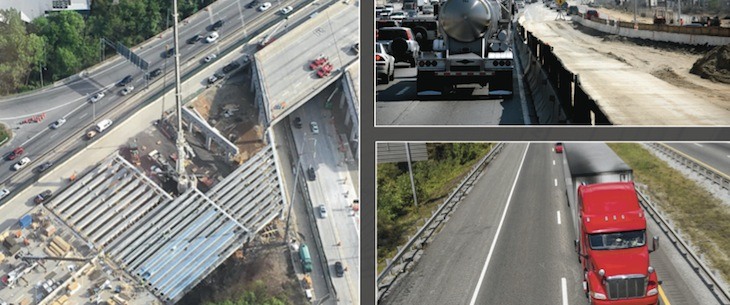Report: Fuel tax hike is only ‘meaningful’ solution to pay for Trump infrastructure plan
by November 10, 2017 2:52 pm 492 views

A federal fuel tax increase is the “only meaningful mechanism” to pay for President Donald Trump’s proposed infrastructure improvements, according to the nonprofit research organization of the American Trucking Associations.
On Thursday (Nov. 9), the American Transportation Research Institute (ATRI) released the report, A Framework for Infrastructure Funding, about paying for the improvements.
Other possible ways to pay for the improvements “will fall far short of the needed revenue stream without placing undue hardship on system users,” according to ATRI. Some of those included mileage-based user fees and increasing tolls.
David O’Neal, vice president of safety programs and industry engagement for the Arkansas Trucking Association, said Trump seeing a federal fuel tax increase as a viable option to pay for the improvements might lead U.S. legislators to support an increase. They have taken strong positions against raising taxes, and no one wants to be the first to raise their hand in support of one.
But they understand something must be done because of the condition of existing roads and bridges.
“We’re at a critical mass point,” O’Neal said. The federal fuel tax hasn’t been increased since the early 1990s, and the Arkansas Trucking Association has taken every opportunity to explain the need to lawmakers. “The can has been kicked down the road periodically.”
A federal fuel tax increase would generate the money states need for multi-million dollar matches for federal funds, allowing the United States to reach infrastructure investment goals proposed by Trump and Congress, according to ATRI. Increased infrastructure spending would lead to projected job growth of 6,187 jobs, said Shannon Newton, president of the Arkansas Trucking Association.
“The trucking industry in Arkansas already employs more than 84,000 people,” said Al Heringer IV, chairman of the Arkansas Trucking Association. “We are happy to contribute more to the highway trust fund to ensure that good roads…and good jobs continue to support the Arkansas economy.”
With a 20-cent federal fuel tax increase, nearly 500,000 jobs would be created nationwide, according to ATRI. The ATRI report shows the impact on the economy if nothing is done. The trucking industry contributes more than $18 billion in federal user fees annually, but rising traffic congestion and freight bottlenecks cost the industry more than $63 billion each year, according to ATRI. E-commerce growth is expected to slow as deliveries fail to “meet the real-time demands of U.S. consumers.”
Following are some other findings in the report:
• The new federal vehicle registration fee is expected to be “the most efficient mechanism to fill funding gaps associated with electric vehicle use.”
• A tax on the amount of vehicle miles traveled would require a bureaucracy as large as the IRS to collect, manage and enforce it, as more than 250 million vehicles are registered in the United States. The tax would lead to mileage tax evasion.
• Most toll systems spend more than 10 cents of each dollar they collect on administrative costs, and many are losing money. Nearly all private toll roads in the United States have filed for bankruptcy, and many toll providers have modified their public financial statements, increasing their complexity and decreasing transparency of revenue management, which masks the inefficiency of toll roads.
“ATRI’s research corroborates what many of us have espoused in Washington, D.C., and in every state capital: people are demanding action on transportation investment, and the federal fuel tax is the ideal tool for delivering the much need funding,” said ATA president and CEO Chris Spear.
Members of the ATRI board of directors include Judy McReynolds, chairman, president and CEO of Fort Smith-based ArcBest; and James Reed, president and CEO of Van Buren-based USA Truck. McReynolds is chairman of the ATRI board. Members of the ATRI Research Advisory Committee include Kelly Killingsworth, vice president of inbound transportation for Bentonville-based Wal-Mart Stores Inc.; Dean Newell, vice president-safety, for Little Rock-based Maverick; and Lee Sarratt, director of safety for Lowell-based J.B. Hunt Transport.
